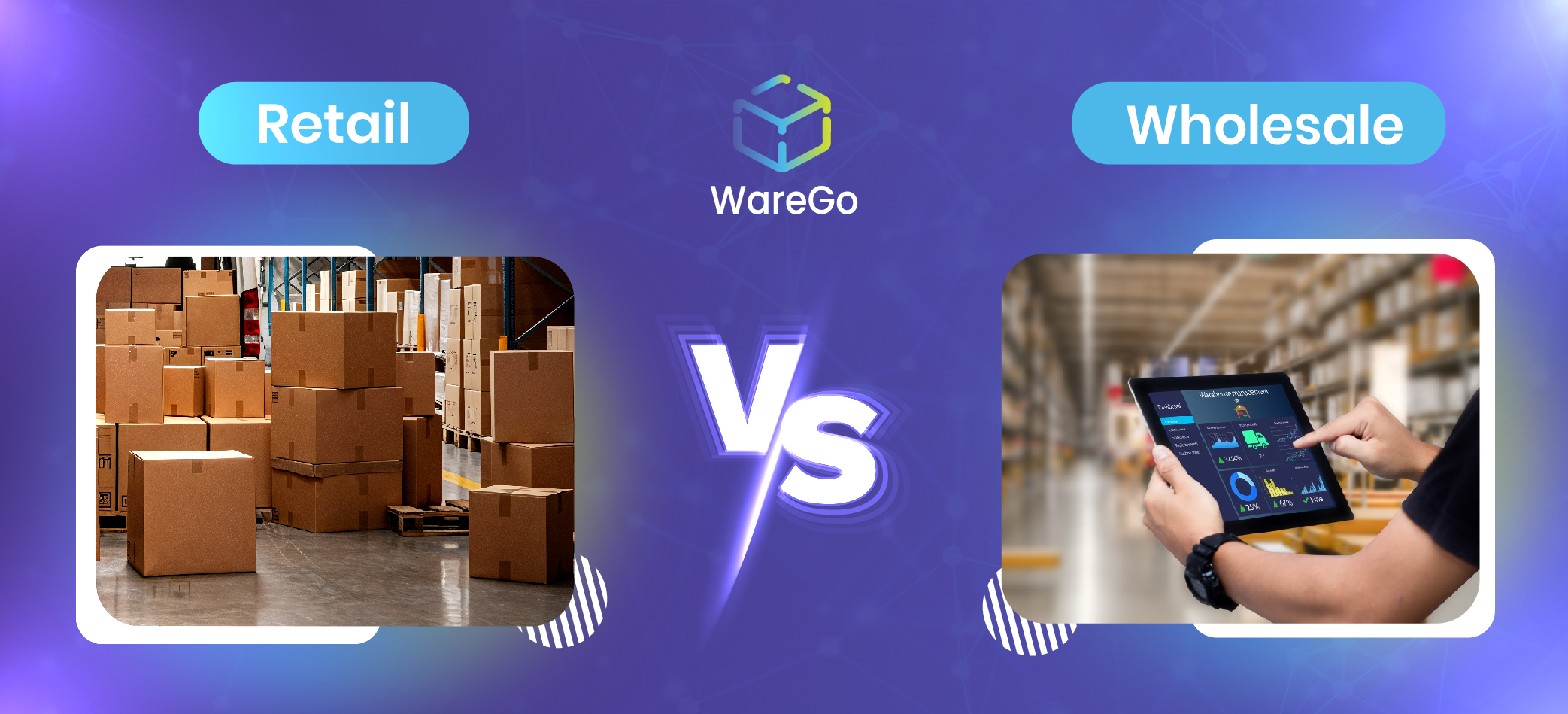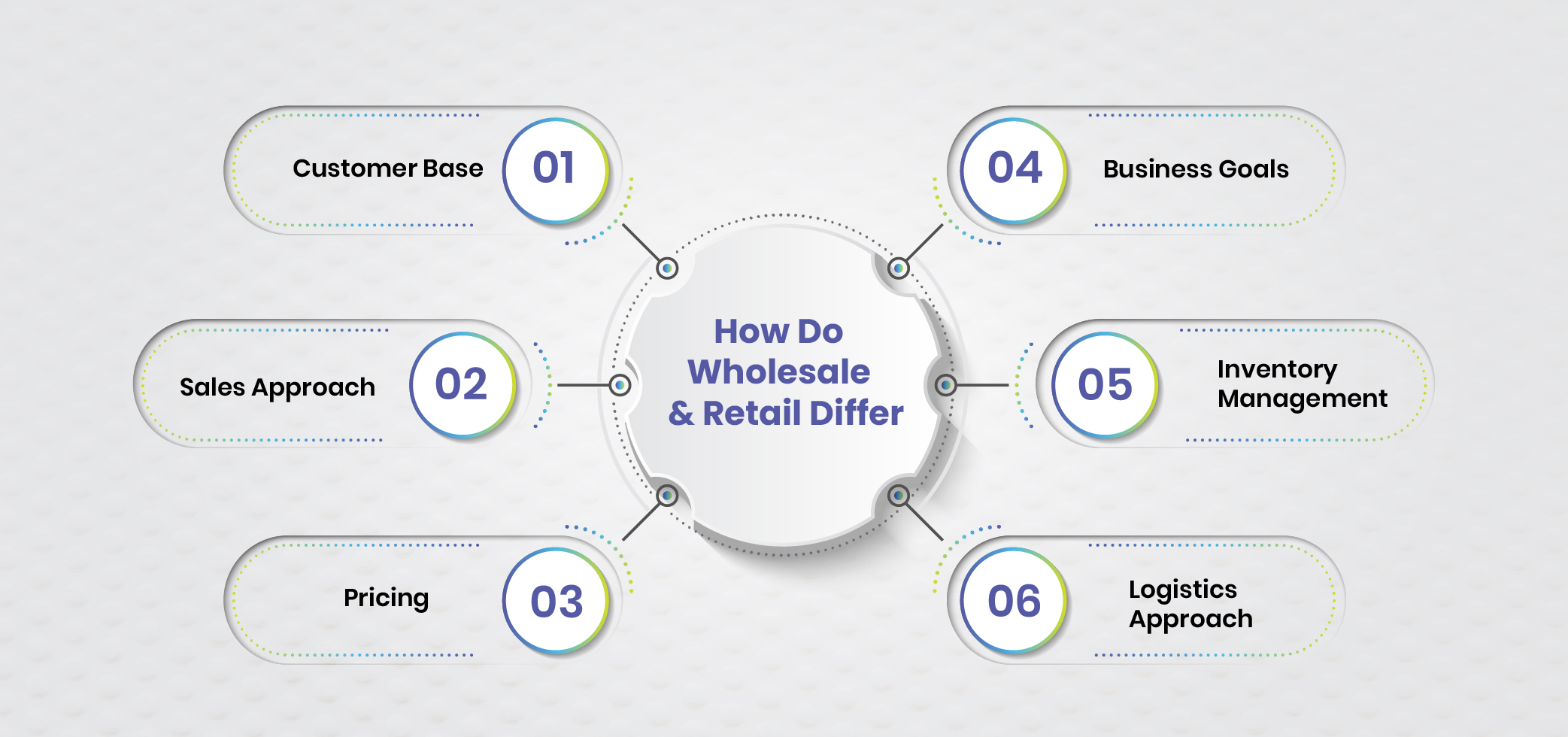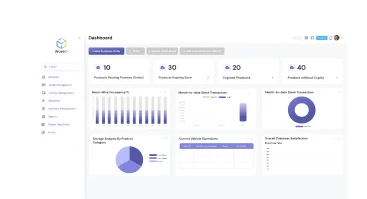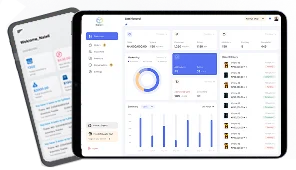
An increasing number of people are choosing to launch their own startups and businesses, driven by the repetitive nature of traditional employment and a growingly favorable business sector. In the United States alone, around $4.7 million businesses are started every year.
Selecting your sales model is a crucial choice, as it not only shapes your pricing but also determines how your business operates entirely.
If you are looking to start your business and are unsure which sales model to choose or if you’re trying to understand the difference between wholesale vs retail, then this blog is for you.
This guide offers an in-depth examination of the differences between retail and wholesale, enabling you to determine which is best suited for your business. Moreover, it will also inform you how to solve everyday challenges of modern businesses by using a wholesale inventory management software.
Table of Contents
Types of Sales Models: Wholesale vs Retail
If you are launching a new business or expanding your existing one, you must have come across the terms “Wholesale vs Retail.” These are the two sales models that shape the foundation of your business and impact how you supply your products:
- Wholesale: Wholesale is a business-to-business (B2B) sales model where, instead of supplying your product directly to the customer, you provide it to other businesses, such as retailers and resellers. This model prioritizes efficiency, productivity, and scalability due to the high volume of bulk orders.
- Retail: Retail is a business-to-customer (B2C) sales model. In retail, you sell your products directly to individual customers. Retail focuses on customer support, branding, marketing, advertising, and fulfilling user orders. In this sales model, orders are small but still arrive in large quantities, each requiring delicate handling to ensure the user experience is not compromised.
Wondering about what a warehouse management system is? Explore our blog to discover how it can help you streamline inventory, enhance order accuracy, and optimize overall warehouse efficiency.
Optimize inventory, boost accuracy, and reduce costs with our all-in-one warehouse management solution.
Request a DemoKey Differences Between Wholesale and Retail

Wholesale and retail are both types of sales models, but they differ immensely in various fields such as inventory management, customer base, and warehouse logistics. Selecting one of these sales models is a serious commitment that shapes the future of your business. Which is why understanding their differences is crucial to determining which model best fulfills your business requirements.
Wholesale
It is a B2B sales model, where your business interacts with other companies, often retailers or other wholesalers, rather than individual customers. Wholesale businesses specialize in fulfilling large orders and bulk shipments.
- Customer Base: Wholesale businesses cater to other companies, such as retailers and distributors. For example, a wholesaler would prefer selling 1000 bars of soap to one retailer than selling 1 bar of soap to 1000 customers.
- Sales Approach: Unlike retailers, wholesalers operate under contracts where a small number of clients place consistent, recurring orders, making long-term reliability more important than a one-time, large order.
- Pricing: Wholesalers often offer different prices to customers depending on the volume of their orders. A buyer who makes a purchase every month will receive a better price than those who make a purchase only once a year.
- Business Goals: Wholesale businesses are highly structured and focus on efficiency and scale. Operations are designed to maximize productivity and minimize handling and processing time. They often focus on automated workflows and scheduled shipments.
- Inventory Management: A wholesaler’s inventory is vast, often comprising multiple warehouses and locations. However, compared to retailers, their inventory is usually more predictable due to the scheduled stockpiling and shipping nature. Implementing wholesale warehouse management software can significantly enhance visibility, minimize errors, and ensure that inventory levels remain in alignment with demand.
- Logistics Approach: Wholesale logistics are designed with bulk movement and process efficiency in mind. Orders are typically handled in large batches, such as whole cartons or boxes. For businesses looking to streamline their distribution even further, understanding how to choose third-party logistics software can play a vital role in enhancing operational efficiency and reducing overhead.
Retail
Retail is a B2C sales model, where your business interacts directly with individual customers, either through physical stores, websites, or mobile applications. Instead of focusing on efficiency and fulfilling large volume orders, Retail businesses specialize in customer satisfaction, branding, and handling small orders for individual customers.
- Customer Base: Retail businesses sell products directly to individual customers in smaller quantities. Retailers handle everything from promoting the product to processing user payments and delivering the goods.
- Sales Approach: Retailers rely on their branding and loyalty of existing customers to attract sales. They use advertisements, promotions, and collaboration to attract potential sales and new customers.
- Pricing: Retail prices are fixed and public. Although their base prices are consistent, retailers often use promotional campaigns, flashy sales, and tempting deals. A product that is generally sold at $20 can be sold for $15 during an event or sale.
- Business Goals: Retail businesses prioritize attracting new customers and retaining existing ones. They don’t compromise on quality, speed, and customer satisfaction. Reputation, which affects aspects such as customer support, refunds, and delivery, must be processed with utmost care.
- Inventory Management: Although retailers’ inventory isn’t as large as wholesalers’, managing their inventory is still challenging because of the unpredictable nature of retail operations. Seasonal events, holidays, and current trends influence the amount and type of items in the inventory. Selecting a reliable retail warehouse management system can enable retailers to manage their inventory with ease.
- Logistics Approach: Retail logistics is built around flexibility, speed, and customer satisfaction. Unlike bulk shipments, every order is prepared, packed, and shipped to each customer.
What Should I Choose: Wholesale or Retail?
The choice between wholesale vs retail depends on your business goals, personal requirements, and target audience. There is no “better option”; both of these sales models are proven to be exceptionally successful in the real world, if implemented correctly.
If you want to work with a small number of consistent buyers, predictable processing, and are focused on efficiency and scale, the wholesale model would suit you better. If you are a large-scale manufacturer or distributor who wants to sell products in bulk, then wholesale is almost always the better option.
On the other hand, if you want to establish a more substantial presence in the market, such as having a reputable brand, direct customer connections, and capitalizing on market trends, then a retail sales model will be the best fit for you.
If you’re deciding on an inventory system for either model, understanding the differences between cloud-based and on-premise inventory software is crucial. The right deployment method can have a direct impact on how you manage operations, scale your business, and ensure data accessibility.
The following table provides a detailed comparison of the pros and cons of wholesale and retail.
| Wholesale | |
| Pros | Cons |
| Predictable revenue | Lower profit margins |
| Fewer clients | Relatively unknown to the average consumer |
| Lower customer service cost | |
| Easier to scale | |
| Retail | |
| Pros | Cons |
| Direct customer interaction | Requires more customer support |
| Higher profit margins | New trends can affect existing stocks |
| Strong reputation control | More complex and personalized orders |
| Flexible products | |
Get a one-on-one consultation and discover how to streamline your warehouse operations with ease.
Book Your ConsultationWMS Solution for Modern Businesses
Nowadays, even small businesses are vast and complex compared to the standards of the early 2000s. The consumer market and its demands have skyrocketed, and companies are trying to catch up.
Fulfilling this increased demand is no longer possible with the traditional manual methods. Both wholesale and retail businesses face challenges as they grow, as tracking their inventory, processing user orders, managing shipments, and avoiding errors become substantially more complex.
This is where a Warehouse Management System (WMS) comes in; it is an advanced software designed to streamline your business’s workflow. A modern warehouse management software like WareGo gives businesses the flexibility and luxury to focus on growth and strategy by optimizing the tedious process of receiving, storing, tracking, and shipping products.
Does WMS support Wholesale and Retail?
Warehouse management software comes in various forms, with some focused on small startups and others on large enterprises. Whether a warehouse management service will work well for retail or wholesale depends on its features, such as inventory tracking, scalability, integration, and other key factors.
A warehouse management software with features such as bulk ordering, multi-warehouse support, and batch tracking would be a better fit for wholesale operations. In contrast, a warehouse management software that offers customer support features, refund management, and easy integration would be more suitable for retail.
However, some modern warehouse management systems support both retail and wholesale businesses. For example, WareGo caters to both wholesale and retail. For retail, WareGo offers features such as real-time inventory syncing, refund management, and seamless integration.
Wholesale, WareGo offers bulk order handling, batch tracking, and multi-warehouse support, making it a suitable option for both retail and wholesale businesses.
Final Words
Wholesale and retail are both sales models, each with its unique pros and cons. Both of them have been proven successful in the real world; therefore, there is no single answer as to which one you should choose. Whether you should opt for a retail or wholesale model primarily depends on your business needs, requirements, and personal goals.
However, picking a model is just the first step. As your business grows, so will the complexity and challenges of sustaining it. This is where tools like WareGo come in handy; they offer powerful and flexible management systems for both wholesale and retail, enabling your business to become automated, efficient, and more productive.
WareGo is here to help you identify bottlenecks and recommend innovative, scalable solutions.
Get Started NowFAQs
What is better to buy: wholesale or retail?
Buying from a wholesaler is often more cost-effective than retail, but it requires purchasing in large quantities with minimal customization options. However, buying from a retailer will cost more because of the retailer’s markup, but it is more accessible, customizable, and doesn’t require large orders. For example, from a retail store, you can get a Pepsi and a Fanta, but from a wholesaler, you would have to buy a whole carton of each.
Is Amazon retail or wholesale?
Most of what you see on Amazon is products sold by individual retailers and vendors. However, Amazon also deals wholesale through Amazon Business and Amazon Vendor Central, where it purchases items in bulk from large manufacturers and sells them to customers. Amazon is primarily a retail service, but also conducts wholesale operations.
Is Walmart retail or wholesale?
Wallmat is a retail business that sells products directly to individual customers either through physical stores or via online applications. However, Walmart also has a wholesale front through “Sam’s Club”. Sam’s Club is a warehouse chain that works with a wholesale model, supplying bulk orders to small businesses at discounted prices.
What is the difference between wholesale and retail?
In a nutshell, wholesale is a business-to-business (B2B) model where products are supplied in bulk to businesses without direct interaction with individual customers. In contrast, retail is a business-to-consumer (B2C) model where products are provided directly to consumers. Each has its unique differences and advantages, and choosing one ultimately depends on your specific needs.





